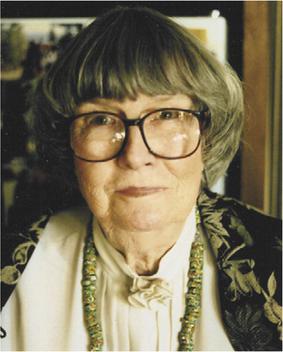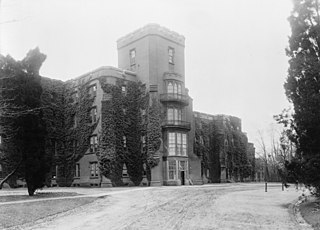Related Research Articles

Margaret Thaler Singer was an American clinical psychologist and researcher with her colleague Lyman Wynne on family communication. She was a prominent figure in the study of undue influence in social and religious contexts, and a proponent of the brainwashing theory of new religious movements.

St. Elizabeths Hospital is a psychiatric hospital in Southeast Washington, D.C. operated by the District of Columbia Department of Mental Health. The hospital opened in 1855 under the name Government Hospital for the Insane, the first federally operated psychiatric hospital in the United States.

A psychologist is a professional who practices psychology and studies mental states, perceptual, cognitive, emotional, and social processes and behavior. Their work often involves the experimentation, observation, and interpretation of how individuals relate to each other and to their environments.
Forensic psychology is the practice of psychology applied to the law. Forensic psychology is the application of scientific knowledge and methods to help answer legal questions arising in criminal, civil, contractual, or other judicial proceedings. Forensic psychology includes research on various psychology-law topics, such as jury selection, reducing systemic racism in criminal law, eyewitness testimony, evaluating competency to stand trial, or assessing military veterans for service-connected disability compensation. The American Psychological Association's Specialty Guidelines for Forensic Psychologists reference several psychology subdisciplines, such as social, clinical, experimental, counseling, and neuropsychology.

The Doctor of Psychology is a professional doctoral degree intended to prepare graduates for careers that apply scientific knowledge of psychology and deliver empirically based service to individuals, groups and organizations. Earning the degree was originally completed through one of two established training models for clinical psychology. However, Psy.D. programs are no longer limited to Clinical Psychology as several universities and professional schools have begun to award professional doctorates in Business Psychology, Organizational Development, Forensic Psychology, Counseling Psychology, and School Psychology.

Margaret Floy Washburn, was a leading American psychologist in the early 20th century, was best known for her experimental work in animal behavior and motor theory development. She was the first woman to be granted a PhD in psychology (1894); the second woman, after Mary Whiton Calkins, to serve as president of the American Psychological Association (1921); and the first woman elected to the Society of Experimental Psychologists. A Review of General Psychology survey, published in 2002, ranked Washburn as the 88th most cited psychologist of the 20th century, tied with John Garcia, James J. Gibson, David Rumelhart, Louis Leon Thurstone, and Robert S. Woodworth.
Lise Van Susteren is an American psychiatrist, commentator, author and environmental activist. She is a general and forensic psychiatrist in Washington, D.C., and an expert on the physical and psychological impacts of climate change.
The Institute for the Psychological Sciences (IPS) is a graduate school of psychology and an integral part of Divine Mercy University (DMU) in Sterling, Virginia. The institute was founded in 1999 with the mission of basing the scientific study of psychology on a Catholic understanding of the person, marriage, and the family, as well as being an international center for scholarship and professional training. It seeks to educate new generations of psychologists and mental health professionals, as well as open new areas of research for psychological theories that explore the relationship between psychology and the Catholic-Christian understanding of the human person.

Military psychology is a specialization within psychology that applies psychological science to promote the readiness of military members, organizations, and operations. Military psychologists provide support to the military in many ways, including through direct clinical care, consultation to military commanders, teaching others and supporting military training, and through research relevant to military operations and personnel. Military psychology as a field has been growing since the early 20th century, evidence that the demands and needs for psychological clinical and operational application is continuing to grow steadily. There are many stressors associated with military service, including exposure to high-risk training and combat. As such, psychologists are critical support components that assist military leaders in designing appropriate training programs, providing oversight to those programs, and assisting military members as they navigate the challenges of military training and their new lifestyle. Military psychology covers a wide range of fields throughout the military including operational, tactical, and occupational psychology. Gender differences between military-trained personnel who seek mental health assistance have been extensively studied. Specific examples include post traumatic stress disorder (PTSD) associated with combat, or guilt and family/partner difficulties accompanying extended or frequent deployments due to separation. Clinical providers in military psychology are often focused on the treatment of stress, fatigue, and other personal readiness issues. Previous wars such as the Korean war, Vietnam war, and WW 2 provide great insight to the workings and practices of military psychology and how the practices have changed and assisted the military over the years.
Rodney L. Lowman is an American psychologist, academic administrator and entrepreneur whose major contributions have been in the areas of career assessment and counseling, ethical issues in Industrial and Organizational Psychology, the integration of clinical psychology and I-O psychology and helping to develop the field of consulting psychology. In a study of the most prolific contributors to the Consulting Psychology Journal: Practice and Research, Lowman was rated the second highest contributor for articles for the period 1992–2007.
Psychology encompasses a vast domain, and includes many different approaches to the study of mental processes and behavior. Below are the major areas of inquiry that taken together constitute psychology. A comprehensive list of the sub-fields and areas within psychology can be found at the list of psychology topics and list of psychology disciplines.

Ruth Winifred Howard was an American psychologist. She is best known for her psychological work concerning students with special needs at Children's Provident Hospital School. She is one of the first African American women to earn a Ph.D. in Psychology. Howard was an active participant in the American Psychological Association, the International Council of Women Psychologists, the American Association of University Women, the National Association of College Women, and the Women's International League for Peace and Freedom. She also received instruction from Florence Goodenough.
Ronald Roesch is a professor of psychology at Simon Fraser University in British Columbia, Canada.
Janet Allison Taylor Spence was an American psychologist who worked in the field of the psychology of anxiety and in gender studies.
Theodora Mead Abel (1899–1998) was an American clinical psychologist and educator, who used innovative ideas by combining sociology and psychology. She was a pioneer in cross-cultural psychology.
Lois Barclay Murphy was an American developmental psychologist who had an important impact on the study of normal child development. Murphy was instrumental in changing the ways in which children were viewed in psychology—previous work tended to focus on pathology, while Murphy emphasized more positive and social elements, including normal development and the development of empathy and ethics in children. She collaborated on 16 works with her husband, Gardner Murphy, published a book about his work after his death as well as several on her own work. She founded the Early Childhood Center (EEC), a college laboratory school focused on child development, at Sarah Lawrence College in 1937 which is still in operation today. Murphy was presented with the G. Stanley Hall Award in developmental psychology in recognition of her contributions to the field.
Pauline Elizabeth Scarborough was an American historian of Psychology, born in Ruston, Louisiana. Scarborough transformed the understanding of early American Psychology through her work on the role and impact of women in the field.
Lisa A. Goodman is an American counseling psychologist known for her research on domestic violence and violence against women. She is Professor of Counseling Psychology at the Lynch School of Education at Boston College. Goodman is a Fellow of the American Psychological Association, Division of Counseling Psychology.
Ellen Kitch Childs was an American clinical psychologist and a lesbian activist known for her participation in the women's liberation movement in North America and for advocating for minority women, prostitutes, gays and lesbians. She was a founding member of the University of Chicago's Gay Liberation and the first African American woman to earn her doctorate degree in Human Development at the University of Chicago.

Isabelle Kendig was a prominent clinical psychologist in the mid-20th century United States. She was best known as Head Psychologist at St. Elizabeths Hospital in Washington, D.C. In that role she was part of a cohort of senior clinicians that helped guide the expansion of clinical psychology in the post-WWII era. She also qualified as a member of the second generation of women psychologists in the U.S.
References
- 1 2 3 4 5 "Feminist Voices - Margaret Ives". Feminist Voices. Retrieved 2023-03-28.
- 1 2 3 4 5 6 7 8 9 10 11 12 Agnes N. O'Connell; Nancy Felipe Russo (1983). Models of achievement : reflections of eminent women in psychology. New York: Columbia University Press. ISBN 0-231-05312-6. OCLC 9112240.
- ↑ Stanley L. Brodsky; Thomas Grisso, eds. (2018). The roots of modern psychology and law : a narrative history. New York, NY. ISBN 978-0-19-068870-7. OCLC 1029210406.
{{cite book}}: CS1 maint: location missing publisher (link) - ↑ "FamilySearch.org". ancestors.familysearch.org. Retrieved 2023-03-28.
- ↑ "Wayne County Michigan". genealogytrails.com. Retrieved 2023-03-28.
- ↑ "St. Elizabeths Hospital". doi:10.3998/mpub.11519906.cmp95 . Retrieved 2023-03-28.
{{cite journal}}: Cite journal requires|journal=(help) - 1 2 "Jenkins v. United States". American Psychological Association. Retrieved 2023-03-28.
- ↑ "Durham v. United States, 214 F.2d 862 (D.C. Cir. 1954)". Justia Law. Retrieved 2023-03-28.
- ↑ Chandra, Anita; Gresenz, Carole Roan; Blanchard, Janice C.; Cuellar, Alison Evans; Ruder, Teague; Chen, Alex Y.; Gillen, Emily Meredith (2009). "Health and Health Care Among District of Columbia Youth: Summary". PsycEXTRA Dataset. Retrieved 2024-01-26.
- ↑ "Psychologist Margaret Ives". Washington Post. ISSN 0190-8286 . Retrieved 2023-03-28.